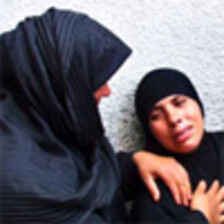The Electronic Intifada 25 March 2009
GAZA CITY, occupied Gaza Strip (IRIN) - The UN Development Fund for Women (UNIFEM) in Gaza, local Palestinian non-governmental organizations and mental health professionals are reporting increased incidents of domestic violence and sexual assault against women in Gaza since the beginning of 2009.
An unpublished UNIFEM survey of male and female heads of 1,100 Gaza households conducted between 28 February and 3 March indicates there was an increase in violence against women during and after the 23-day war which ended on 18 January.
“According to our staff, and through clinical observation, there was increased violence against women and children during and after the war,” said public relations coordinator for the Gaza Community Mental Health Programme (GCMHP), Husam al-Nounou.
“We can attribute this to the fact that most people were exposed to traumatic incidents during the war, and one way people react to stress is to become violent.”
GCMHP, which runs six clinics and treats an estimated 2,000 mental health patients a year, carried out a post-war assessment, interviewing about 3,500 Gaza residents, said al-Nounou.
“This war was extremely harsh, people felt insecure, vulnerable and unable to protect themselves, their children and their families; when people were trapped at home this increased the stress and anxiety,” said al-Nounou.
Testimonies
Sahar (who wanted her family name omitted), 36, divorced her husband in February due to the physical and psychological abuse she endured leading up to and during the war.
“He beat me severely and I was fainting from the stress,” said Sahar. “He forced me to engage in sexual intercourse against my will.”
Sahar brings her two-year-old daughter to the Palestinian Centre for Democracy and Conflict Resolution (PCDCR) to visit the daughter’s father. The court ordered supervised visits after Sahar’s ex-husband and his brothers tried to take her daughter away by force.
“Before the war the center was facilitating supervised visits for 30 families, but now it is doing this for 60 families,” said Bakr Turkmani, an attorney at the PCDCR.
“The number of divorce and separation cases has increased significantly since the war, and domestic violence played a role in the increase,” he said.
“My husband beat me and insulted me,” said another victim of domestic violence from Gaza City who preferred anonymity. Recently divorced, she also brings her nine-month old son to PCSCR for weekly supervised meetings with his father.
“If I do not accompany the victims to the police station, their reports of abuse are not accepted,” said Turkmani.
Human rights center
Director of the women’s unit at the leading Palestinian human rights organization, the Palestinian Centre for Human Rights (PCHR), Muna al-Shawa, said the center had received reports of increased domestic violence and sexual assault during and after the hostilities. The unit had counseled over 600 women.
“During and after the war women struggled to fulfill their roles as mothers, and care for their children without electricity and water, while under attack,” said al-Shawa, “and if the husband died, sometimes the father-in-law took the inheritance and tried to take custody of the children.”
PCHR is providing legal advice to widows.
The Women’s Affairs Centre (WAC) in Gaza said it had organized meetings with 200 women across Gaza after the war.
“Many women who never experienced violence at home, were beaten during the war,” WAC director Amal Siam told IRIN.
Scores of women who lost their husbands came to WAC seeking assistance after their fathers-in-law tried to take custody of their children, said Siam, adding that there had been an increased number of divorce cases during the hostilities.
According to UNIFEM, the results of the first UN interagency gender needs assessment are due in May.
This item comes to you via IRIN, a UN humanitarian news and information service, but may not necessarily reflect the views of the United Nations or its agencies. All IRIN material may be reposted or reprinted free-of-charge; refer to the copyright page for conditions of use. IRIN is a project of the UN Office for the Coordination of Humanitarian Affairs.

